Macroeconomics: Principles, Applications, and UK Economic Challenges
VerifiedAdded on 2023/06/08
|11
|3725
|142
Report
AI Summary
This report delves into the principles and applications of macroeconomics within the United Kingdom's economic system. It begins by defining macroeconomic policies and their objectives, such as controlling inflation, improving living standards, achieving equilibrium in the balance of payments, and fostering sustainable economic development. The report highlights the UK's mixed economic system, which combines socialist and capitalist elements. It further discusses how the government uses macroeconomic policies, including heterodox and conservative approaches, to promote economic welfare by addressing gender disparities, wage differentiation, and labor market issues. The report also examines obstacles the UK faces in achieving macroeconomic goals, such as the impacts of Brexit and the Covid-19 pandemic, which have led to economic instability and declines in GDP. The analysis emphasizes the importance of fiscal and monetary policies in mitigating these challenges and ensuring the economic well-being of the country's citizens. Desklib provides students access to similar solved assignments and study tools.
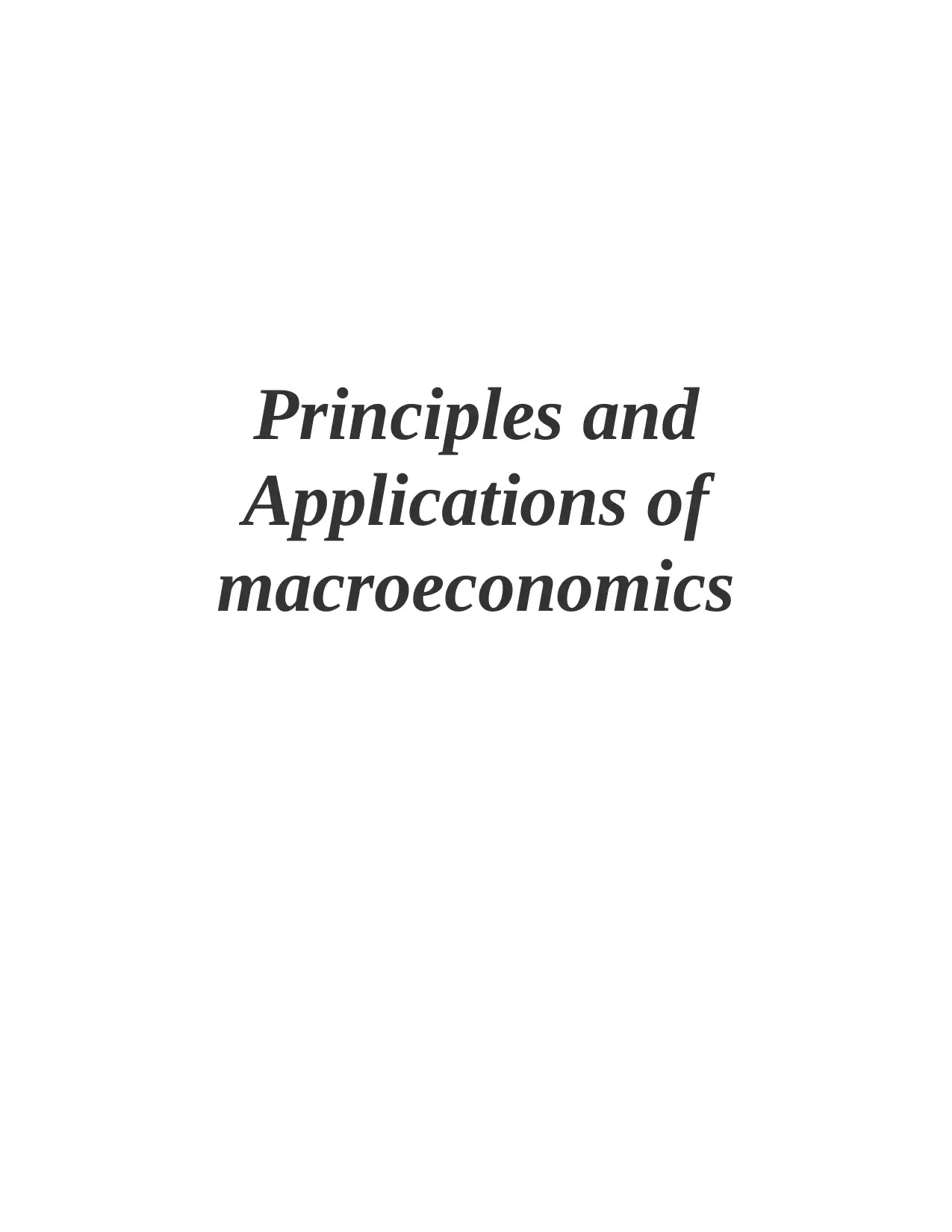
Principles and
Applications of
macroeconomics
Applications of
macroeconomics
Paraphrase This Document
Need a fresh take? Get an instant paraphrase of this document with our AI Paraphraser
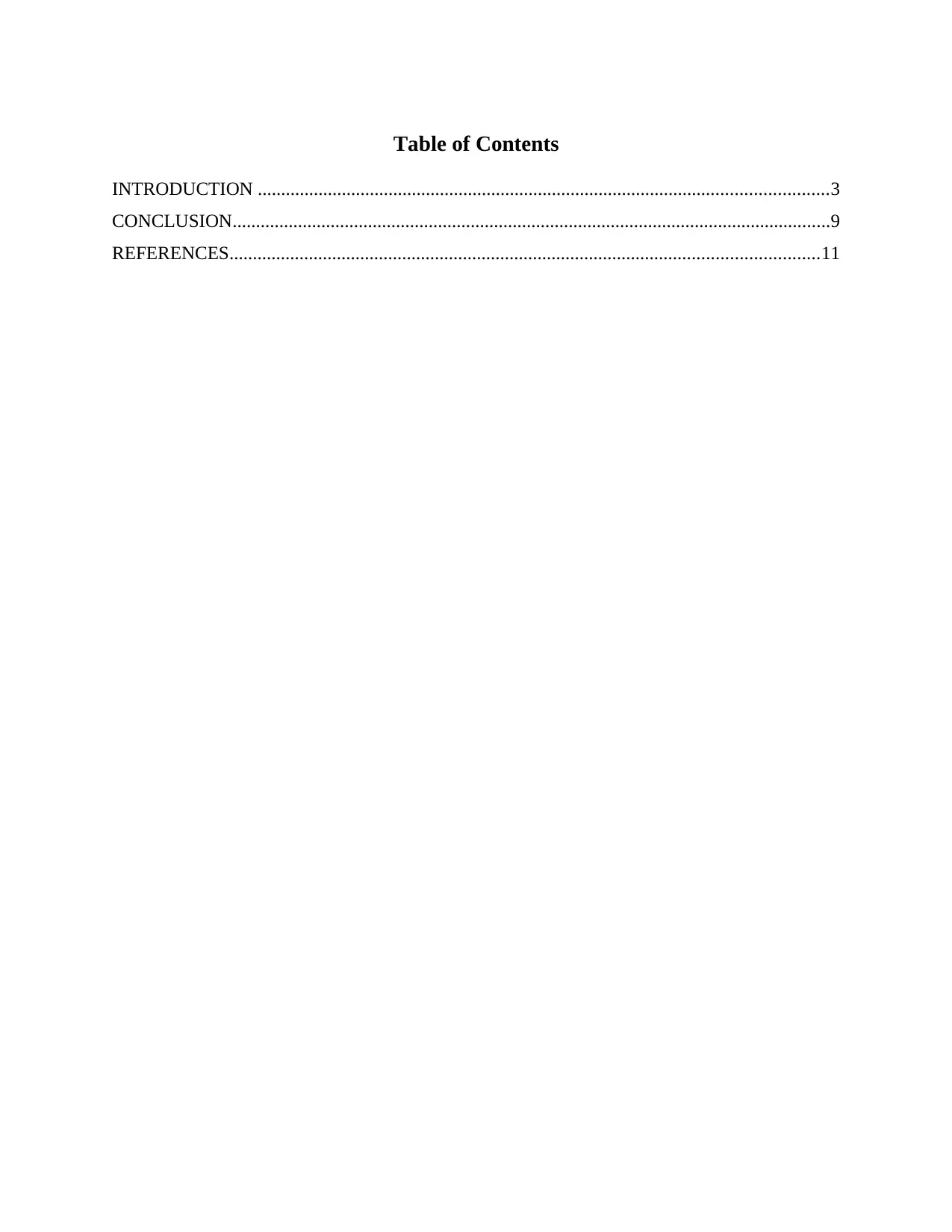
Table of Contents
INTRODUCTION ..........................................................................................................................3
CONCLUSION................................................................................................................................9
REFERENCES..............................................................................................................................11
INTRODUCTION ..........................................................................................................................3
CONCLUSION................................................................................................................................9
REFERENCES..............................................................................................................................11
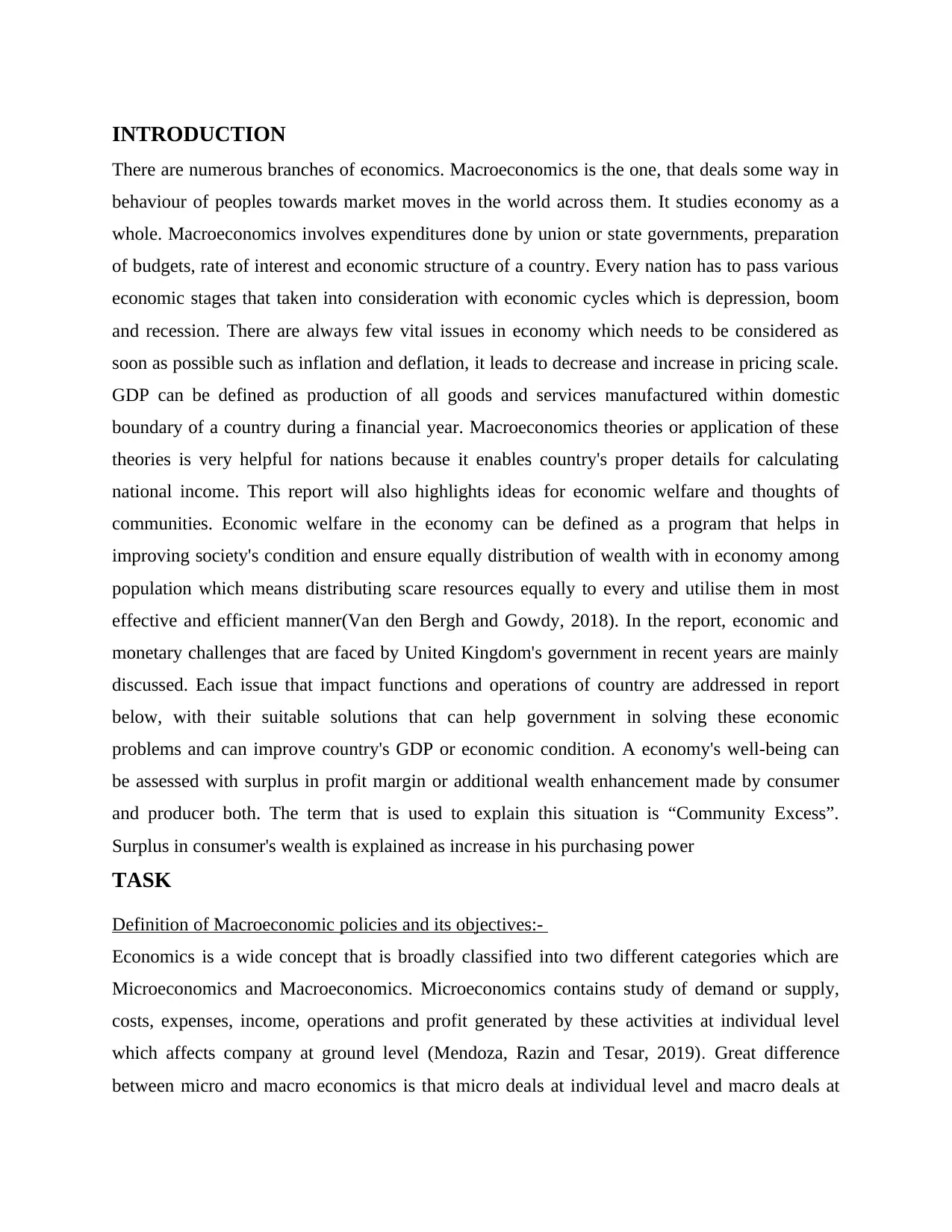
INTRODUCTION
There are numerous branches of economics. Macroeconomics is the one, that deals some way in
behaviour of peoples towards market moves in the world across them. It studies economy as a
whole. Macroeconomics involves expenditures done by union or state governments, preparation
of budgets, rate of interest and economic structure of a country. Every nation has to pass various
economic stages that taken into consideration with economic cycles which is depression, boom
and recession. There are always few vital issues in economy which needs to be considered as
soon as possible such as inflation and deflation, it leads to decrease and increase in pricing scale.
GDP can be defined as production of all goods and services manufactured within domestic
boundary of a country during a financial year. Macroeconomics theories or application of these
theories is very helpful for nations because it enables country's proper details for calculating
national income. This report will also highlights ideas for economic welfare and thoughts of
communities. Economic welfare in the economy can be defined as a program that helps in
improving society's condition and ensure equally distribution of wealth with in economy among
population which means distributing scare resources equally to every and utilise them in most
effective and efficient manner(Van den Bergh and Gowdy, 2018). In the report, economic and
monetary challenges that are faced by United Kingdom's government in recent years are mainly
discussed. Each issue that impact functions and operations of country are addressed in report
below, with their suitable solutions that can help government in solving these economic
problems and can improve country's GDP or economic condition. A economy's well-being can
be assessed with surplus in profit margin or additional wealth enhancement made by consumer
and producer both. The term that is used to explain this situation is “Community Excess”.
Surplus in consumer's wealth is explained as increase in his purchasing power
TASK
Definition of Macroeconomic policies and its objectives:-
Economics is a wide concept that is broadly classified into two different categories which are
Microeconomics and Macroeconomics. Microeconomics contains study of demand or supply,
costs, expenses, income, operations and profit generated by these activities at individual level
which affects company at ground level (Mendoza, Razin and Tesar, 2019). Great difference
between micro and macro economics is that micro deals at individual level and macro deals at
There are numerous branches of economics. Macroeconomics is the one, that deals some way in
behaviour of peoples towards market moves in the world across them. It studies economy as a
whole. Macroeconomics involves expenditures done by union or state governments, preparation
of budgets, rate of interest and economic structure of a country. Every nation has to pass various
economic stages that taken into consideration with economic cycles which is depression, boom
and recession. There are always few vital issues in economy which needs to be considered as
soon as possible such as inflation and deflation, it leads to decrease and increase in pricing scale.
GDP can be defined as production of all goods and services manufactured within domestic
boundary of a country during a financial year. Macroeconomics theories or application of these
theories is very helpful for nations because it enables country's proper details for calculating
national income. This report will also highlights ideas for economic welfare and thoughts of
communities. Economic welfare in the economy can be defined as a program that helps in
improving society's condition and ensure equally distribution of wealth with in economy among
population which means distributing scare resources equally to every and utilise them in most
effective and efficient manner(Van den Bergh and Gowdy, 2018). In the report, economic and
monetary challenges that are faced by United Kingdom's government in recent years are mainly
discussed. Each issue that impact functions and operations of country are addressed in report
below, with their suitable solutions that can help government in solving these economic
problems and can improve country's GDP or economic condition. A economy's well-being can
be assessed with surplus in profit margin or additional wealth enhancement made by consumer
and producer both. The term that is used to explain this situation is “Community Excess”.
Surplus in consumer's wealth is explained as increase in his purchasing power
TASK
Definition of Macroeconomic policies and its objectives:-
Economics is a wide concept that is broadly classified into two different categories which are
Microeconomics and Macroeconomics. Microeconomics contains study of demand or supply,
costs, expenses, income, operations and profit generated by these activities at individual level
which affects company at ground level (Mendoza, Razin and Tesar, 2019). Great difference
between micro and macro economics is that micro deals at individual level and macro deals at
⊘ This is a preview!⊘
Do you want full access?
Subscribe today to unlock all pages.

Trusted by 1+ million students worldwide
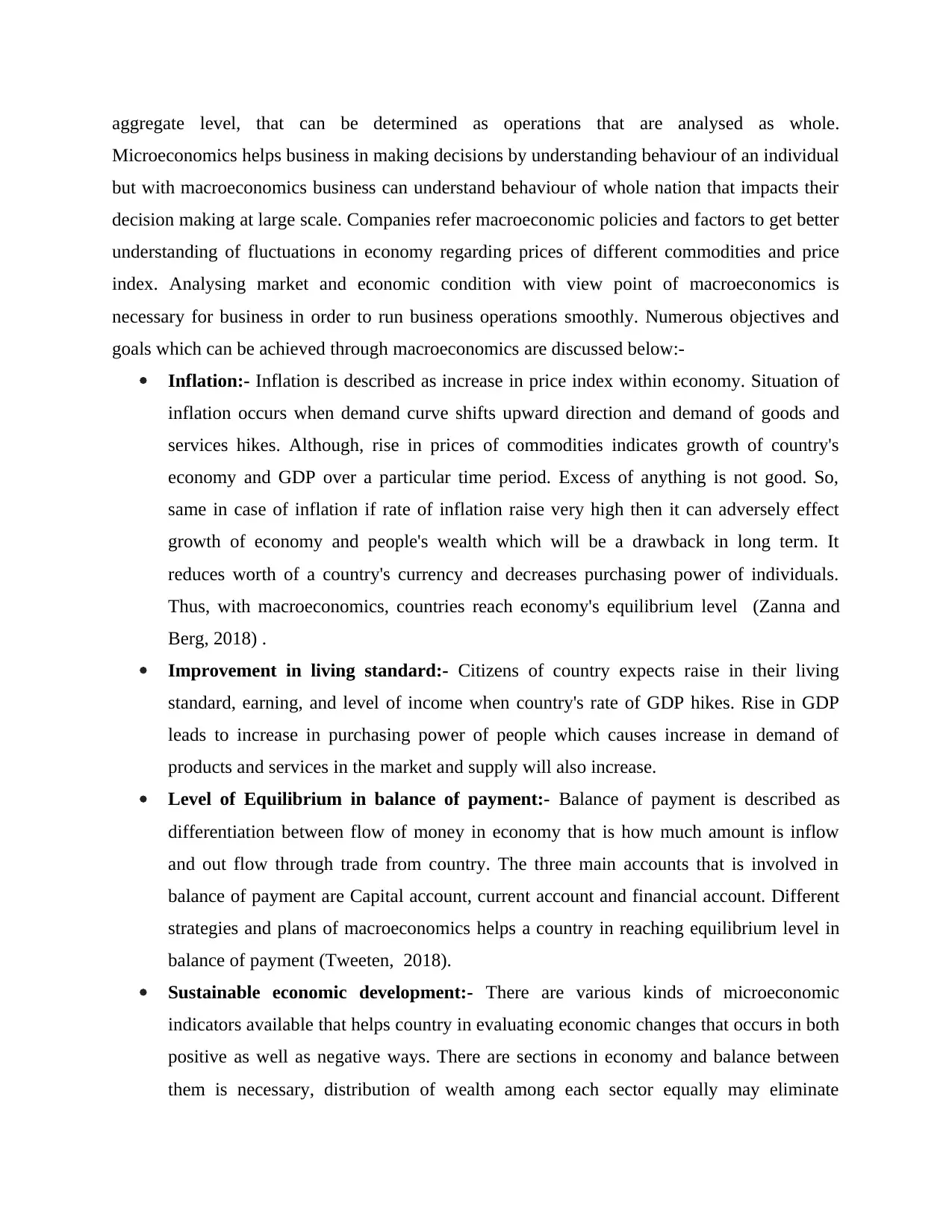
aggregate level, that can be determined as operations that are analysed as whole.
Microeconomics helps business in making decisions by understanding behaviour of an individual
but with macroeconomics business can understand behaviour of whole nation that impacts their
decision making at large scale. Companies refer macroeconomic policies and factors to get better
understanding of fluctuations in economy regarding prices of different commodities and price
index. Analysing market and economic condition with view point of macroeconomics is
necessary for business in order to run business operations smoothly. Numerous objectives and
goals which can be achieved through macroeconomics are discussed below:-
Inflation:- Inflation is described as increase in price index within economy. Situation of
inflation occurs when demand curve shifts upward direction and demand of goods and
services hikes. Although, rise in prices of commodities indicates growth of country's
economy and GDP over a particular time period. Excess of anything is not good. So,
same in case of inflation if rate of inflation raise very high then it can adversely effect
growth of economy and people's wealth which will be a drawback in long term. It
reduces worth of a country's currency and decreases purchasing power of individuals.
Thus, with macroeconomics, countries reach economy's equilibrium level (Zanna and
Berg, 2018) .
Improvement in living standard:- Citizens of country expects raise in their living
standard, earning, and level of income when country's rate of GDP hikes. Rise in GDP
leads to increase in purchasing power of people which causes increase in demand of
products and services in the market and supply will also increase.
Level of Equilibrium in balance of payment:- Balance of payment is described as
differentiation between flow of money in economy that is how much amount is inflow
and out flow through trade from country. The three main accounts that is involved in
balance of payment are Capital account, current account and financial account. Different
strategies and plans of macroeconomics helps a country in reaching equilibrium level in
balance of payment (Tweeten, 2018).
Sustainable economic development:- There are various kinds of microeconomic
indicators available that helps country in evaluating economic changes that occurs in both
positive as well as negative ways. There are sections in economy and balance between
them is necessary, distribution of wealth among each sector equally may eliminate
Microeconomics helps business in making decisions by understanding behaviour of an individual
but with macroeconomics business can understand behaviour of whole nation that impacts their
decision making at large scale. Companies refer macroeconomic policies and factors to get better
understanding of fluctuations in economy regarding prices of different commodities and price
index. Analysing market and economic condition with view point of macroeconomics is
necessary for business in order to run business operations smoothly. Numerous objectives and
goals which can be achieved through macroeconomics are discussed below:-
Inflation:- Inflation is described as increase in price index within economy. Situation of
inflation occurs when demand curve shifts upward direction and demand of goods and
services hikes. Although, rise in prices of commodities indicates growth of country's
economy and GDP over a particular time period. Excess of anything is not good. So,
same in case of inflation if rate of inflation raise very high then it can adversely effect
growth of economy and people's wealth which will be a drawback in long term. It
reduces worth of a country's currency and decreases purchasing power of individuals.
Thus, with macroeconomics, countries reach economy's equilibrium level (Zanna and
Berg, 2018) .
Improvement in living standard:- Citizens of country expects raise in their living
standard, earning, and level of income when country's rate of GDP hikes. Rise in GDP
leads to increase in purchasing power of people which causes increase in demand of
products and services in the market and supply will also increase.
Level of Equilibrium in balance of payment:- Balance of payment is described as
differentiation between flow of money in economy that is how much amount is inflow
and out flow through trade from country. The three main accounts that is involved in
balance of payment are Capital account, current account and financial account. Different
strategies and plans of macroeconomics helps a country in reaching equilibrium level in
balance of payment (Tweeten, 2018).
Sustainable economic development:- There are various kinds of microeconomic
indicators available that helps country in evaluating economic changes that occurs in both
positive as well as negative ways. There are sections in economy and balance between
them is necessary, distribution of wealth among each sector equally may eliminate
Paraphrase This Document
Need a fresh take? Get an instant paraphrase of this document with our AI Paraphraser
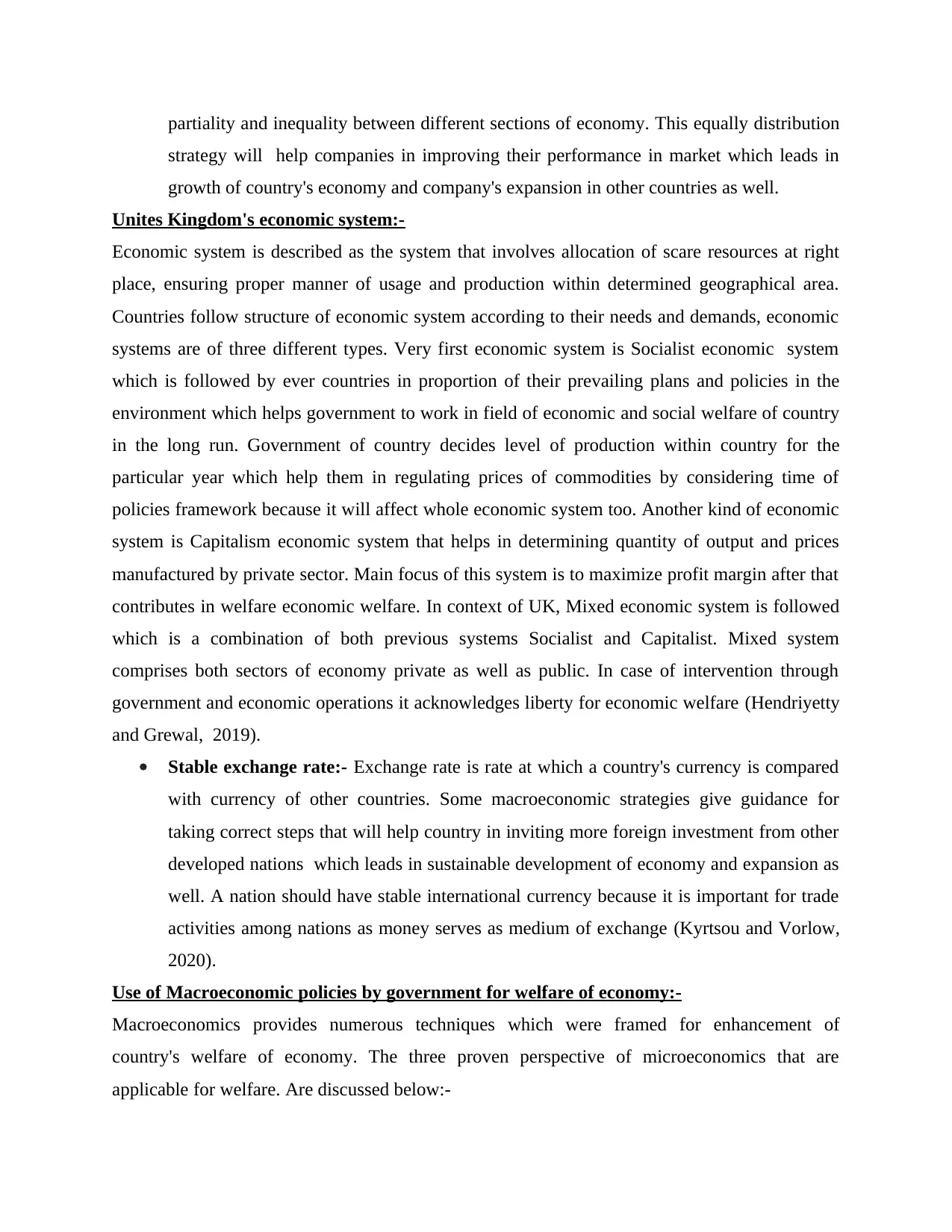
partiality and inequality between different sections of economy. This equally distribution
strategy will help companies in improving their performance in market which leads in
growth of country's economy and company's expansion in other countries as well.
Unites Kingdom's economic system:-
Economic system is described as the system that involves allocation of scare resources at right
place, ensuring proper manner of usage and production within determined geographical area.
Countries follow structure of economic system according to their needs and demands, economic
systems are of three different types. Very first economic system is Socialist economic system
which is followed by ever countries in proportion of their prevailing plans and policies in the
environment which helps government to work in field of economic and social welfare of country
in the long run. Government of country decides level of production within country for the
particular year which help them in regulating prices of commodities by considering time of
policies framework because it will affect whole economic system too. Another kind of economic
system is Capitalism economic system that helps in determining quantity of output and prices
manufactured by private sector. Main focus of this system is to maximize profit margin after that
contributes in welfare economic welfare. In context of UK, Mixed economic system is followed
which is a combination of both previous systems Socialist and Capitalist. Mixed system
comprises both sectors of economy private as well as public. In case of intervention through
government and economic operations it acknowledges liberty for economic welfare (Hendriyetty
and Grewal, 2019).
Stable exchange rate:- Exchange rate is rate at which a country's currency is compared
with currency of other countries. Some macroeconomic strategies give guidance for
taking correct steps that will help country in inviting more foreign investment from other
developed nations which leads in sustainable development of economy and expansion as
well. A nation should have stable international currency because it is important for trade
activities among nations as money serves as medium of exchange (Kyrtsou and Vorlow,
2020).
Use of Macroeconomic policies by government for welfare of economy:-
Macroeconomics provides numerous techniques which were framed for enhancement of
country's welfare of economy. The three proven perspective of microeconomics that are
applicable for welfare. Are discussed below:-
strategy will help companies in improving their performance in market which leads in
growth of country's economy and company's expansion in other countries as well.
Unites Kingdom's economic system:-
Economic system is described as the system that involves allocation of scare resources at right
place, ensuring proper manner of usage and production within determined geographical area.
Countries follow structure of economic system according to their needs and demands, economic
systems are of three different types. Very first economic system is Socialist economic system
which is followed by ever countries in proportion of their prevailing plans and policies in the
environment which helps government to work in field of economic and social welfare of country
in the long run. Government of country decides level of production within country for the
particular year which help them in regulating prices of commodities by considering time of
policies framework because it will affect whole economic system too. Another kind of economic
system is Capitalism economic system that helps in determining quantity of output and prices
manufactured by private sector. Main focus of this system is to maximize profit margin after that
contributes in welfare economic welfare. In context of UK, Mixed economic system is followed
which is a combination of both previous systems Socialist and Capitalist. Mixed system
comprises both sectors of economy private as well as public. In case of intervention through
government and economic operations it acknowledges liberty for economic welfare (Hendriyetty
and Grewal, 2019).
Stable exchange rate:- Exchange rate is rate at which a country's currency is compared
with currency of other countries. Some macroeconomic strategies give guidance for
taking correct steps that will help country in inviting more foreign investment from other
developed nations which leads in sustainable development of economy and expansion as
well. A nation should have stable international currency because it is important for trade
activities among nations as money serves as medium of exchange (Kyrtsou and Vorlow,
2020).
Use of Macroeconomic policies by government for welfare of economy:-
Macroeconomics provides numerous techniques which were framed for enhancement of
country's welfare of economy. The three proven perspective of microeconomics that are
applicable for welfare. Are discussed below:-
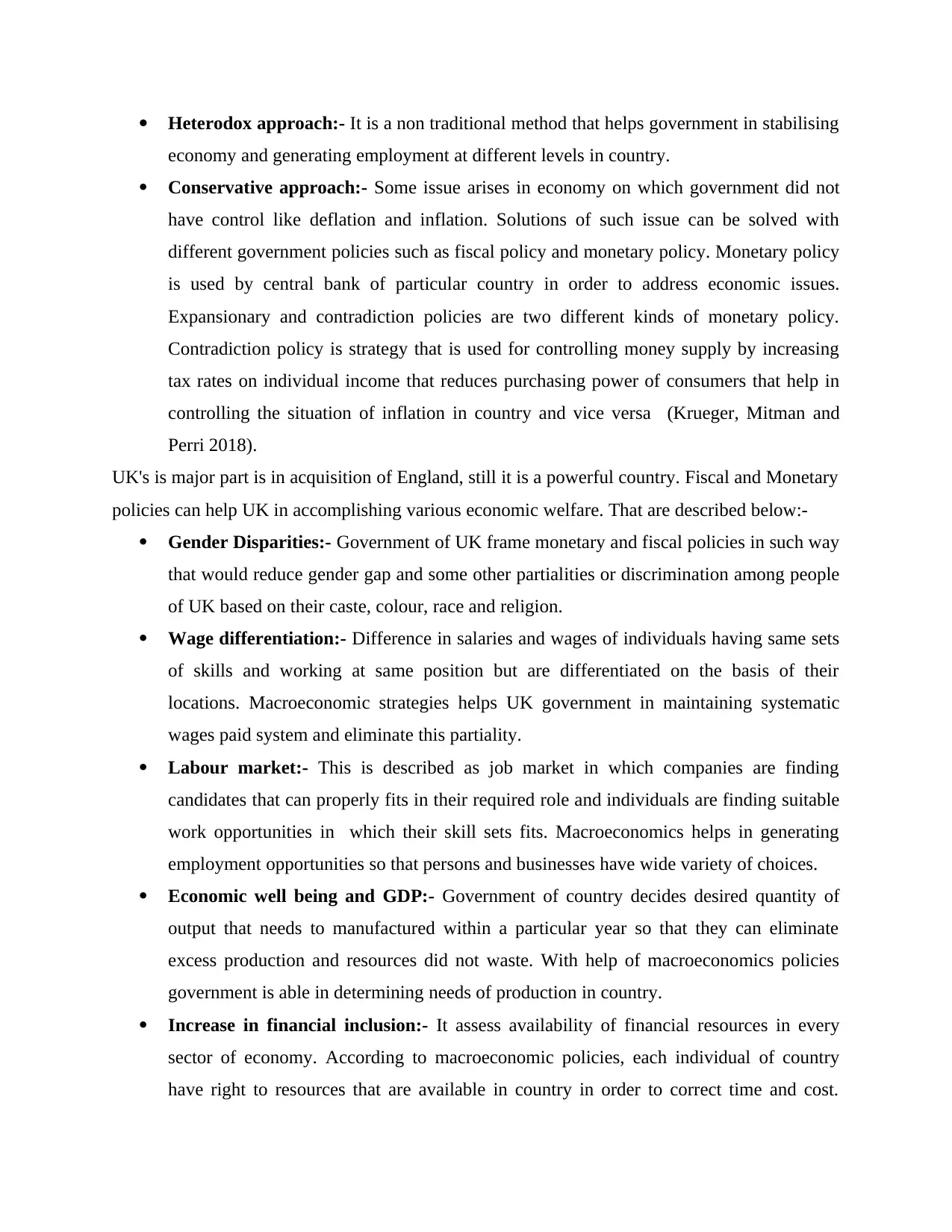
Heterodox approach:- It is a non traditional method that helps government in stabilising
economy and generating employment at different levels in country.
Conservative approach:- Some issue arises in economy on which government did not
have control like deflation and inflation. Solutions of such issue can be solved with
different government policies such as fiscal policy and monetary policy. Monetary policy
is used by central bank of particular country in order to address economic issues.
Expansionary and contradiction policies are two different kinds of monetary policy.
Contradiction policy is strategy that is used for controlling money supply by increasing
tax rates on individual income that reduces purchasing power of consumers that help in
controlling the situation of inflation in country and vice versa (Krueger, Mitman and
Perri 2018).
UK's is major part is in acquisition of England, still it is a powerful country. Fiscal and Monetary
policies can help UK in accomplishing various economic welfare. That are described below:-
Gender Disparities:- Government of UK frame monetary and fiscal policies in such way
that would reduce gender gap and some other partialities or discrimination among people
of UK based on their caste, colour, race and religion.
Wage differentiation:- Difference in salaries and wages of individuals having same sets
of skills and working at same position but are differentiated on the basis of their
locations. Macroeconomic strategies helps UK government in maintaining systematic
wages paid system and eliminate this partiality.
Labour market:- This is described as job market in which companies are finding
candidates that can properly fits in their required role and individuals are finding suitable
work opportunities in which their skill sets fits. Macroeconomics helps in generating
employment opportunities so that persons and businesses have wide variety of choices.
Economic well being and GDP:- Government of country decides desired quantity of
output that needs to manufactured within a particular year so that they can eliminate
excess production and resources did not waste. With help of macroeconomics policies
government is able in determining needs of production in country.
Increase in financial inclusion:- It assess availability of financial resources in every
sector of economy. According to macroeconomic policies, each individual of country
have right to resources that are available in country in order to correct time and cost.
economy and generating employment at different levels in country.
Conservative approach:- Some issue arises in economy on which government did not
have control like deflation and inflation. Solutions of such issue can be solved with
different government policies such as fiscal policy and monetary policy. Monetary policy
is used by central bank of particular country in order to address economic issues.
Expansionary and contradiction policies are two different kinds of monetary policy.
Contradiction policy is strategy that is used for controlling money supply by increasing
tax rates on individual income that reduces purchasing power of consumers that help in
controlling the situation of inflation in country and vice versa (Krueger, Mitman and
Perri 2018).
UK's is major part is in acquisition of England, still it is a powerful country. Fiscal and Monetary
policies can help UK in accomplishing various economic welfare. That are described below:-
Gender Disparities:- Government of UK frame monetary and fiscal policies in such way
that would reduce gender gap and some other partialities or discrimination among people
of UK based on their caste, colour, race and religion.
Wage differentiation:- Difference in salaries and wages of individuals having same sets
of skills and working at same position but are differentiated on the basis of their
locations. Macroeconomic strategies helps UK government in maintaining systematic
wages paid system and eliminate this partiality.
Labour market:- This is described as job market in which companies are finding
candidates that can properly fits in their required role and individuals are finding suitable
work opportunities in which their skill sets fits. Macroeconomics helps in generating
employment opportunities so that persons and businesses have wide variety of choices.
Economic well being and GDP:- Government of country decides desired quantity of
output that needs to manufactured within a particular year so that they can eliminate
excess production and resources did not waste. With help of macroeconomics policies
government is able in determining needs of production in country.
Increase in financial inclusion:- It assess availability of financial resources in every
sector of economy. According to macroeconomic policies, each individual of country
have right to resources that are available in country in order to correct time and cost.
⊘ This is a preview!⊘
Do you want full access?
Subscribe today to unlock all pages.

Trusted by 1+ million students worldwide
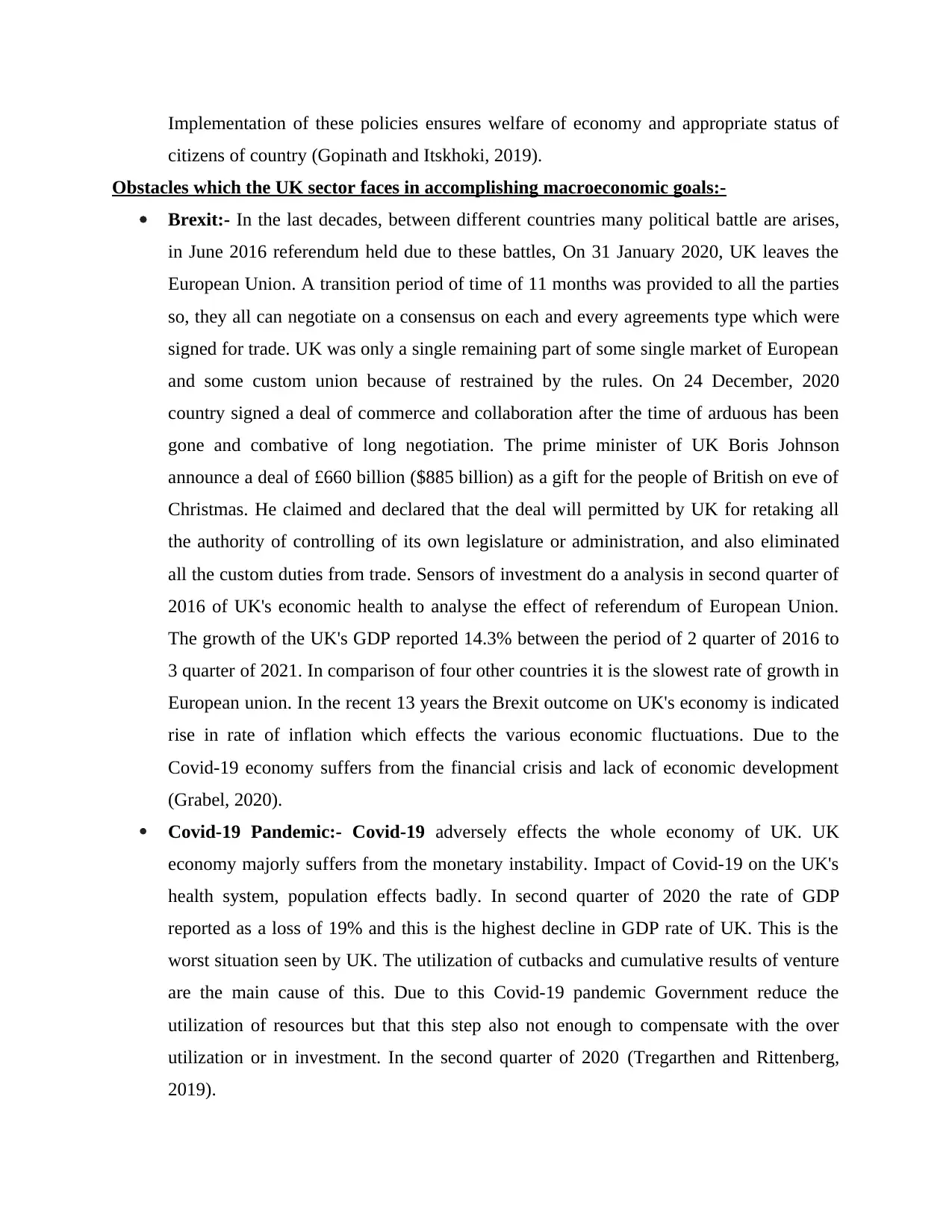
Implementation of these policies ensures welfare of economy and appropriate status of
citizens of country (Gopinath and Itskhoki, 2019).
Obstacles which the UK sector faces in accomplishing macroeconomic goals:-
Brexit:- In the last decades, between different countries many political battle are arises,
in June 2016 referendum held due to these battles, On 31 January 2020, UK leaves the
European Union. A transition period of time of 11 months was provided to all the parties
so, they all can negotiate on a consensus on each and every agreements type which were
signed for trade. UK was only a single remaining part of some single market of European
and some custom union because of restrained by the rules. On 24 December, 2020
country signed a deal of commerce and collaboration after the time of arduous has been
gone and combative of long negotiation. The prime minister of UK Boris Johnson
announce a deal of £660 billion ($885 billion) as a gift for the people of British on eve of
Christmas. He claimed and declared that the deal will permitted by UK for retaking all
the authority of controlling of its own legislature or administration, and also eliminated
all the custom duties from trade. Sensors of investment do a analysis in second quarter of
2016 of UK's economic health to analyse the effect of referendum of European Union.
The growth of the UK's GDP reported 14.3% between the period of 2 quarter of 2016 to
3 quarter of 2021. In comparison of four other countries it is the slowest rate of growth in
European union. In the recent 13 years the Brexit outcome on UK's economy is indicated
rise in rate of inflation which effects the various economic fluctuations. Due to the
Covid-19 economy suffers from the financial crisis and lack of economic development
(Grabel, 2020).
Covid-19 Pandemic:- Covid-19 adversely effects the whole economy of UK. UK
economy majorly suffers from the monetary instability. Impact of Covid-19 on the UK's
health system, population effects badly. In second quarter of 2020 the rate of GDP
reported as a loss of 19% and this is the highest decline in GDP rate of UK. This is the
worst situation seen by UK. The utilization of cutbacks and cumulative results of venture
are the main cause of this. Due to this Covid-19 pandemic Government reduce the
utilization of resources but that this step also not enough to compensate with the over
utilization or in investment. In the second quarter of 2020 (Tregarthen and Rittenberg,
2019).
citizens of country (Gopinath and Itskhoki, 2019).
Obstacles which the UK sector faces in accomplishing macroeconomic goals:-
Brexit:- In the last decades, between different countries many political battle are arises,
in June 2016 referendum held due to these battles, On 31 January 2020, UK leaves the
European Union. A transition period of time of 11 months was provided to all the parties
so, they all can negotiate on a consensus on each and every agreements type which were
signed for trade. UK was only a single remaining part of some single market of European
and some custom union because of restrained by the rules. On 24 December, 2020
country signed a deal of commerce and collaboration after the time of arduous has been
gone and combative of long negotiation. The prime minister of UK Boris Johnson
announce a deal of £660 billion ($885 billion) as a gift for the people of British on eve of
Christmas. He claimed and declared that the deal will permitted by UK for retaking all
the authority of controlling of its own legislature or administration, and also eliminated
all the custom duties from trade. Sensors of investment do a analysis in second quarter of
2016 of UK's economic health to analyse the effect of referendum of European Union.
The growth of the UK's GDP reported 14.3% between the period of 2 quarter of 2016 to
3 quarter of 2021. In comparison of four other countries it is the slowest rate of growth in
European union. In the recent 13 years the Brexit outcome on UK's economy is indicated
rise in rate of inflation which effects the various economic fluctuations. Due to the
Covid-19 economy suffers from the financial crisis and lack of economic development
(Grabel, 2020).
Covid-19 Pandemic:- Covid-19 adversely effects the whole economy of UK. UK
economy majorly suffers from the monetary instability. Impact of Covid-19 on the UK's
health system, population effects badly. In second quarter of 2020 the rate of GDP
reported as a loss of 19% and this is the highest decline in GDP rate of UK. This is the
worst situation seen by UK. The utilization of cutbacks and cumulative results of venture
are the main cause of this. Due to this Covid-19 pandemic Government reduce the
utilization of resources but that this step also not enough to compensate with the over
utilization or in investment. In the second quarter of 2020 (Tregarthen and Rittenberg,
2019).
Paraphrase This Document
Need a fresh take? Get an instant paraphrase of this document with our AI Paraphraser
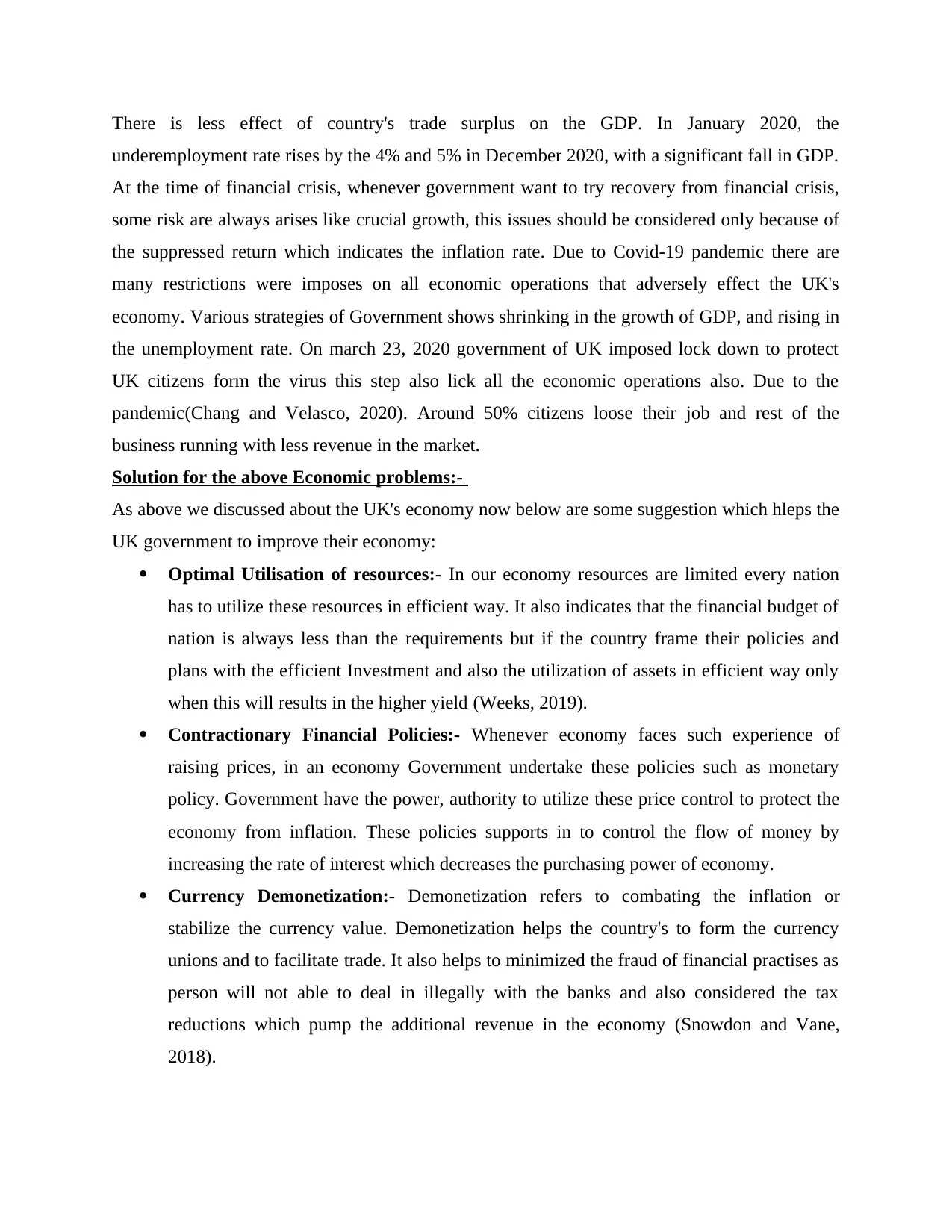
There is less effect of country's trade surplus on the GDP. In January 2020, the
underemployment rate rises by the 4% and 5% in December 2020, with a significant fall in GDP.
At the time of financial crisis, whenever government want to try recovery from financial crisis,
some risk are always arises like crucial growth, this issues should be considered only because of
the suppressed return which indicates the inflation rate. Due to Covid-19 pandemic there are
many restrictions were imposes on all economic operations that adversely effect the UK's
economy. Various strategies of Government shows shrinking in the growth of GDP, and rising in
the unemployment rate. On march 23, 2020 government of UK imposed lock down to protect
UK citizens form the virus this step also lick all the economic operations also. Due to the
pandemic(Chang and Velasco, 2020). Around 50% citizens loose their job and rest of the
business running with less revenue in the market.
Solution for the above Economic problems:-
As above we discussed about the UK's economy now below are some suggestion which hleps the
UK government to improve their economy:
Optimal Utilisation of resources:- In our economy resources are limited every nation
has to utilize these resources in efficient way. It also indicates that the financial budget of
nation is always less than the requirements but if the country frame their policies and
plans with the efficient Investment and also the utilization of assets in efficient way only
when this will results in the higher yield (Weeks, 2019).
Contractionary Financial Policies:- Whenever economy faces such experience of
raising prices, in an economy Government undertake these policies such as monetary
policy. Government have the power, authority to utilize these price control to protect the
economy from inflation. These policies supports in to control the flow of money by
increasing the rate of interest which decreases the purchasing power of economy.
Currency Demonetization:- Demonetization refers to combating the inflation or
stabilize the currency value. Demonetization helps the country's to form the currency
unions and to facilitate trade. It also helps to minimized the fraud of financial practises as
person will not able to deal in illegally with the banks and also considered the tax
reductions which pump the additional revenue in the economy (Snowdon and Vane,
2018).
underemployment rate rises by the 4% and 5% in December 2020, with a significant fall in GDP.
At the time of financial crisis, whenever government want to try recovery from financial crisis,
some risk are always arises like crucial growth, this issues should be considered only because of
the suppressed return which indicates the inflation rate. Due to Covid-19 pandemic there are
many restrictions were imposes on all economic operations that adversely effect the UK's
economy. Various strategies of Government shows shrinking in the growth of GDP, and rising in
the unemployment rate. On march 23, 2020 government of UK imposed lock down to protect
UK citizens form the virus this step also lick all the economic operations also. Due to the
pandemic(Chang and Velasco, 2020). Around 50% citizens loose their job and rest of the
business running with less revenue in the market.
Solution for the above Economic problems:-
As above we discussed about the UK's economy now below are some suggestion which hleps the
UK government to improve their economy:
Optimal Utilisation of resources:- In our economy resources are limited every nation
has to utilize these resources in efficient way. It also indicates that the financial budget of
nation is always less than the requirements but if the country frame their policies and
plans with the efficient Investment and also the utilization of assets in efficient way only
when this will results in the higher yield (Weeks, 2019).
Contractionary Financial Policies:- Whenever economy faces such experience of
raising prices, in an economy Government undertake these policies such as monetary
policy. Government have the power, authority to utilize these price control to protect the
economy from inflation. These policies supports in to control the flow of money by
increasing the rate of interest which decreases the purchasing power of economy.
Currency Demonetization:- Demonetization refers to combating the inflation or
stabilize the currency value. Demonetization helps the country's to form the currency
unions and to facilitate trade. It also helps to minimized the fraud of financial practises as
person will not able to deal in illegally with the banks and also considered the tax
reductions which pump the additional revenue in the economy (Snowdon and Vane,
2018).
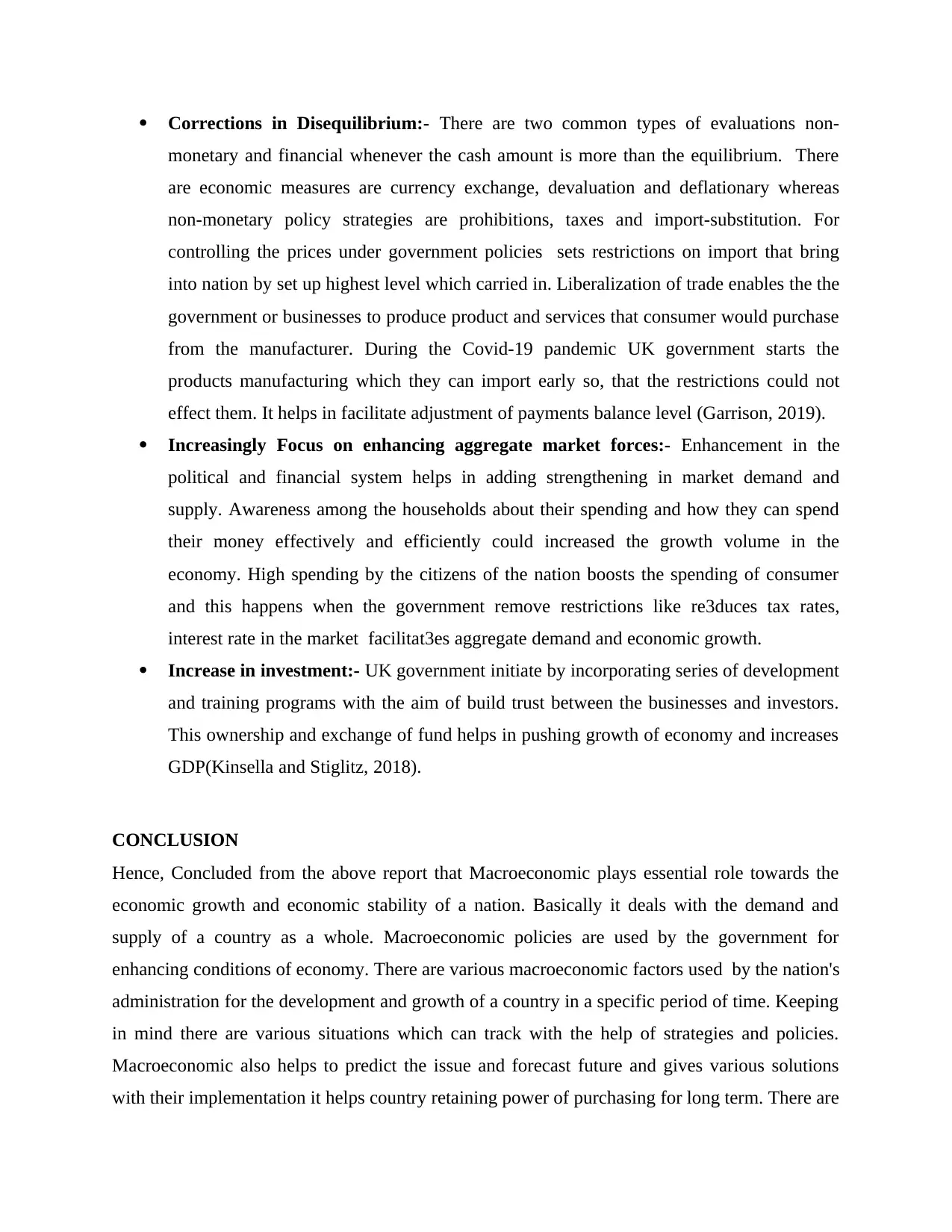
Corrections in Disequilibrium:- There are two common types of evaluations non-
monetary and financial whenever the cash amount is more than the equilibrium. There
are economic measures are currency exchange, devaluation and deflationary whereas
non-monetary policy strategies are prohibitions, taxes and import-substitution. For
controlling the prices under government policies sets restrictions on import that bring
into nation by set up highest level which carried in. Liberalization of trade enables the the
government or businesses to produce product and services that consumer would purchase
from the manufacturer. During the Covid-19 pandemic UK government starts the
products manufacturing which they can import early so, that the restrictions could not
effect them. It helps in facilitate adjustment of payments balance level (Garrison, 2019).
Increasingly Focus on enhancing aggregate market forces:- Enhancement in the
political and financial system helps in adding strengthening in market demand and
supply. Awareness among the households about their spending and how they can spend
their money effectively and efficiently could increased the growth volume in the
economy. High spending by the citizens of the nation boosts the spending of consumer
and this happens when the government remove restrictions like re3duces tax rates,
interest rate in the market facilitat3es aggregate demand and economic growth.
Increase in investment:- UK government initiate by incorporating series of development
and training programs with the aim of build trust between the businesses and investors.
This ownership and exchange of fund helps in pushing growth of economy and increases
GDP(Kinsella and Stiglitz, 2018).
CONCLUSION
Hence, Concluded from the above report that Macroeconomic plays essential role towards the
economic growth and economic stability of a nation. Basically it deals with the demand and
supply of a country as a whole. Macroeconomic policies are used by the government for
enhancing conditions of economy. There are various macroeconomic factors used by the nation's
administration for the development and growth of a country in a specific period of time. Keeping
in mind there are various situations which can track with the help of strategies and policies.
Macroeconomic also helps to predict the issue and forecast future and gives various solutions
with their implementation it helps country retaining power of purchasing for long term. There are
monetary and financial whenever the cash amount is more than the equilibrium. There
are economic measures are currency exchange, devaluation and deflationary whereas
non-monetary policy strategies are prohibitions, taxes and import-substitution. For
controlling the prices under government policies sets restrictions on import that bring
into nation by set up highest level which carried in. Liberalization of trade enables the the
government or businesses to produce product and services that consumer would purchase
from the manufacturer. During the Covid-19 pandemic UK government starts the
products manufacturing which they can import early so, that the restrictions could not
effect them. It helps in facilitate adjustment of payments balance level (Garrison, 2019).
Increasingly Focus on enhancing aggregate market forces:- Enhancement in the
political and financial system helps in adding strengthening in market demand and
supply. Awareness among the households about their spending and how they can spend
their money effectively and efficiently could increased the growth volume in the
economy. High spending by the citizens of the nation boosts the spending of consumer
and this happens when the government remove restrictions like re3duces tax rates,
interest rate in the market facilitat3es aggregate demand and economic growth.
Increase in investment:- UK government initiate by incorporating series of development
and training programs with the aim of build trust between the businesses and investors.
This ownership and exchange of fund helps in pushing growth of economy and increases
GDP(Kinsella and Stiglitz, 2018).
CONCLUSION
Hence, Concluded from the above report that Macroeconomic plays essential role towards the
economic growth and economic stability of a nation. Basically it deals with the demand and
supply of a country as a whole. Macroeconomic policies are used by the government for
enhancing conditions of economy. There are various macroeconomic factors used by the nation's
administration for the development and growth of a country in a specific period of time. Keeping
in mind there are various situations which can track with the help of strategies and policies.
Macroeconomic also helps to predict the issue and forecast future and gives various solutions
with their implementation it helps country retaining power of purchasing for long term. There are
⊘ This is a preview!⊘
Do you want full access?
Subscribe today to unlock all pages.

Trusted by 1+ million students worldwide
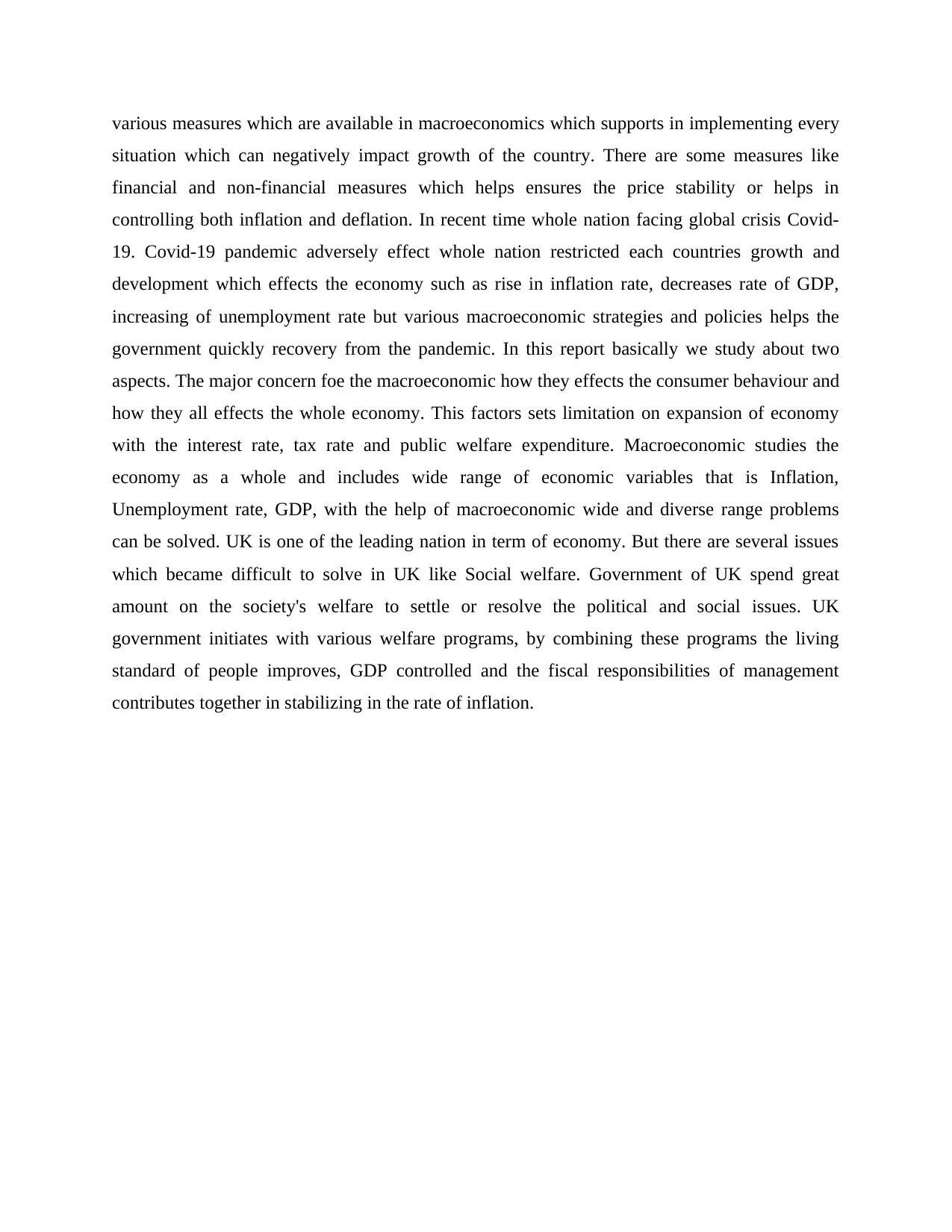
various measures which are available in macroeconomics which supports in implementing every
situation which can negatively impact growth of the country. There are some measures like
financial and non-financial measures which helps ensures the price stability or helps in
controlling both inflation and deflation. In recent time whole nation facing global crisis Covid-
19. Covid-19 pandemic adversely effect whole nation restricted each countries growth and
development which effects the economy such as rise in inflation rate, decreases rate of GDP,
increasing of unemployment rate but various macroeconomic strategies and policies helps the
government quickly recovery from the pandemic. In this report basically we study about two
aspects. The major concern foe the macroeconomic how they effects the consumer behaviour and
how they all effects the whole economy. This factors sets limitation on expansion of economy
with the interest rate, tax rate and public welfare expenditure. Macroeconomic studies the
economy as a whole and includes wide range of economic variables that is Inflation,
Unemployment rate, GDP, with the help of macroeconomic wide and diverse range problems
can be solved. UK is one of the leading nation in term of economy. But there are several issues
which became difficult to solve in UK like Social welfare. Government of UK spend great
amount on the society's welfare to settle or resolve the political and social issues. UK
government initiates with various welfare programs, by combining these programs the living
standard of people improves, GDP controlled and the fiscal responsibilities of management
contributes together in stabilizing in the rate of inflation.
situation which can negatively impact growth of the country. There are some measures like
financial and non-financial measures which helps ensures the price stability or helps in
controlling both inflation and deflation. In recent time whole nation facing global crisis Covid-
19. Covid-19 pandemic adversely effect whole nation restricted each countries growth and
development which effects the economy such as rise in inflation rate, decreases rate of GDP,
increasing of unemployment rate but various macroeconomic strategies and policies helps the
government quickly recovery from the pandemic. In this report basically we study about two
aspects. The major concern foe the macroeconomic how they effects the consumer behaviour and
how they all effects the whole economy. This factors sets limitation on expansion of economy
with the interest rate, tax rate and public welfare expenditure. Macroeconomic studies the
economy as a whole and includes wide range of economic variables that is Inflation,
Unemployment rate, GDP, with the help of macroeconomic wide and diverse range problems
can be solved. UK is one of the leading nation in term of economy. But there are several issues
which became difficult to solve in UK like Social welfare. Government of UK spend great
amount on the society's welfare to settle or resolve the political and social issues. UK
government initiates with various welfare programs, by combining these programs the living
standard of people improves, GDP controlled and the fiscal responsibilities of management
contributes together in stabilizing in the rate of inflation.
Paraphrase This Document
Need a fresh take? Get an instant paraphrase of this document with our AI Paraphraser
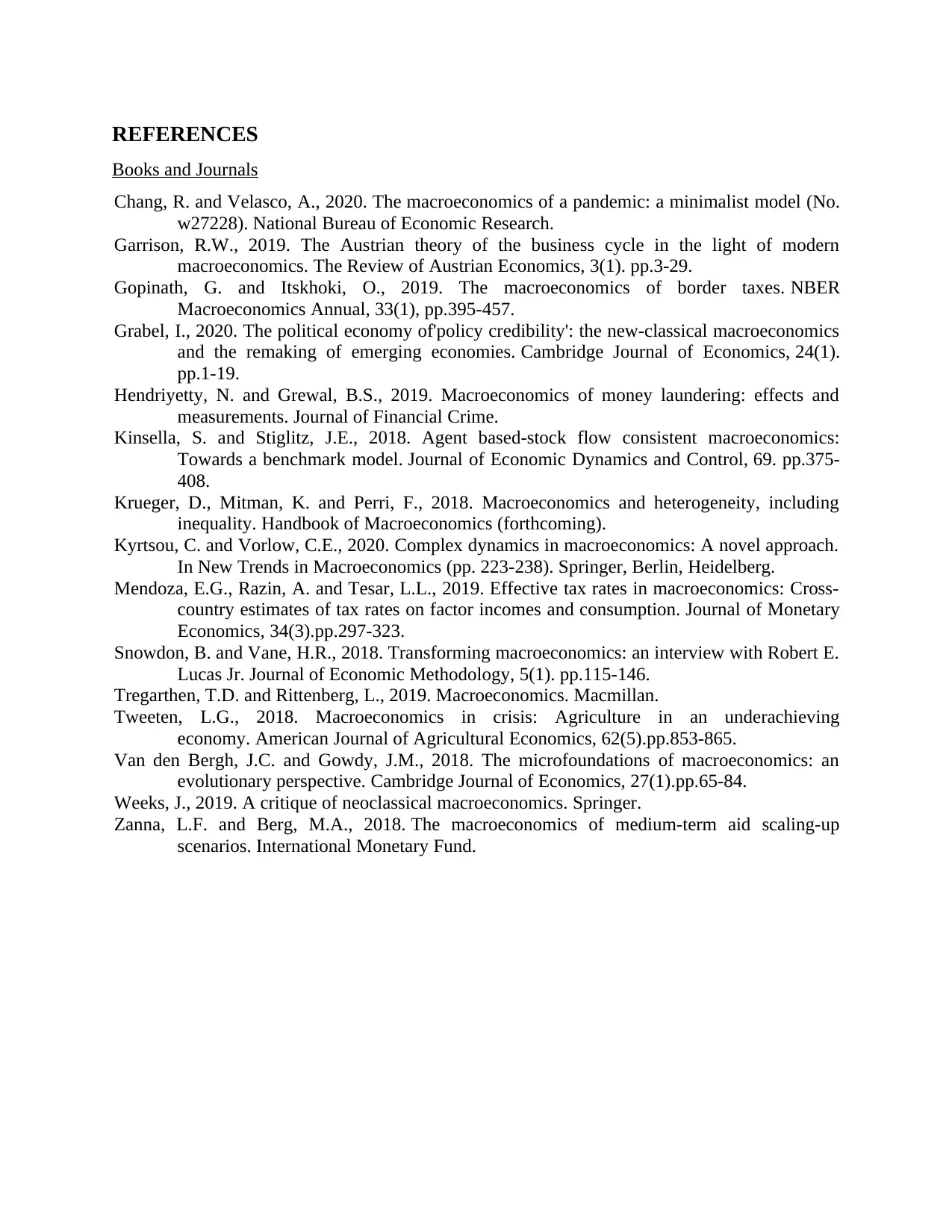
REFERENCES
Books and Journals
Chang, R. and Velasco, A., 2020. The macroeconomics of a pandemic: a minimalist model (No.
w27228). National Bureau of Economic Research.
Garrison, R.W., 2019. The Austrian theory of the business cycle in the light of modern
macroeconomics. The Review of Austrian Economics, 3(1). pp.3-29.
Gopinath, G. and Itskhoki, O., 2019. The macroeconomics of border taxes. NBER
Macroeconomics Annual, 33(1), pp.395-457.
Grabel, I., 2020. The political economy of'policy credibility': the new-classical macroeconomics
and the remaking of emerging economies. Cambridge Journal of Economics, 24(1).
pp.1-19.
Hendriyetty, N. and Grewal, B.S., 2019. Macroeconomics of money laundering: effects and
measurements. Journal of Financial Crime.
Kinsella, S. and Stiglitz, J.E., 2018. Agent based-stock flow consistent macroeconomics:
Towards a benchmark model. Journal of Economic Dynamics and Control, 69. pp.375-
408.
Krueger, D., Mitman, K. and Perri, F., 2018. Macroeconomics and heterogeneity, including
inequality. Handbook of Macroeconomics (forthcoming).
Kyrtsou, C. and Vorlow, C.E., 2020. Complex dynamics in macroeconomics: A novel approach.
In New Trends in Macroeconomics (pp. 223-238). Springer, Berlin, Heidelberg.
Mendoza, E.G., Razin, A. and Tesar, L.L., 2019. Effective tax rates in macroeconomics: Cross-
country estimates of tax rates on factor incomes and consumption. Journal of Monetary
Economics, 34(3).pp.297-323.
Snowdon, B. and Vane, H.R., 2018. Transforming macroeconomics: an interview with Robert E.
Lucas Jr. Journal of Economic Methodology, 5(1). pp.115-146.
Tregarthen, T.D. and Rittenberg, L., 2019. Macroeconomics. Macmillan.
Tweeten, L.G., 2018. Macroeconomics in crisis: Agriculture in an underachieving
economy. American Journal of Agricultural Economics, 62(5).pp.853-865.
Van den Bergh, J.C. and Gowdy, J.M., 2018. The microfoundations of macroeconomics: an
evolutionary perspective. Cambridge Journal of Economics, 27(1).pp.65-84.
Weeks, J., 2019. A critique of neoclassical macroeconomics. Springer.
Zanna, L.F. and Berg, M.A., 2018. The macroeconomics of medium-term aid scaling-up
scenarios. International Monetary Fund.
Books and Journals
Chang, R. and Velasco, A., 2020. The macroeconomics of a pandemic: a minimalist model (No.
w27228). National Bureau of Economic Research.
Garrison, R.W., 2019. The Austrian theory of the business cycle in the light of modern
macroeconomics. The Review of Austrian Economics, 3(1). pp.3-29.
Gopinath, G. and Itskhoki, O., 2019. The macroeconomics of border taxes. NBER
Macroeconomics Annual, 33(1), pp.395-457.
Grabel, I., 2020. The political economy of'policy credibility': the new-classical macroeconomics
and the remaking of emerging economies. Cambridge Journal of Economics, 24(1).
pp.1-19.
Hendriyetty, N. and Grewal, B.S., 2019. Macroeconomics of money laundering: effects and
measurements. Journal of Financial Crime.
Kinsella, S. and Stiglitz, J.E., 2018. Agent based-stock flow consistent macroeconomics:
Towards a benchmark model. Journal of Economic Dynamics and Control, 69. pp.375-
408.
Krueger, D., Mitman, K. and Perri, F., 2018. Macroeconomics and heterogeneity, including
inequality. Handbook of Macroeconomics (forthcoming).
Kyrtsou, C. and Vorlow, C.E., 2020. Complex dynamics in macroeconomics: A novel approach.
In New Trends in Macroeconomics (pp. 223-238). Springer, Berlin, Heidelberg.
Mendoza, E.G., Razin, A. and Tesar, L.L., 2019. Effective tax rates in macroeconomics: Cross-
country estimates of tax rates on factor incomes and consumption. Journal of Monetary
Economics, 34(3).pp.297-323.
Snowdon, B. and Vane, H.R., 2018. Transforming macroeconomics: an interview with Robert E.
Lucas Jr. Journal of Economic Methodology, 5(1). pp.115-146.
Tregarthen, T.D. and Rittenberg, L., 2019. Macroeconomics. Macmillan.
Tweeten, L.G., 2018. Macroeconomics in crisis: Agriculture in an underachieving
economy. American Journal of Agricultural Economics, 62(5).pp.853-865.
Van den Bergh, J.C. and Gowdy, J.M., 2018. The microfoundations of macroeconomics: an
evolutionary perspective. Cambridge Journal of Economics, 27(1).pp.65-84.
Weeks, J., 2019. A critique of neoclassical macroeconomics. Springer.
Zanna, L.F. and Berg, M.A., 2018. The macroeconomics of medium-term aid scaling-up
scenarios. International Monetary Fund.
1 out of 11
Related Documents
Your All-in-One AI-Powered Toolkit for Academic Success.
+13062052269
info@desklib.com
Available 24*7 on WhatsApp / Email
![[object Object]](/_next/static/media/star-bottom.7253800d.svg)
Unlock your academic potential
Copyright © 2020–2026 A2Z Services. All Rights Reserved. Developed and managed by ZUCOL.




